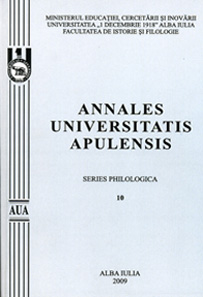Communicating the Cultural Self Across Disciplines: Zora Neale Hurston’s Literary Anthropology
Communicating the Cultural Self Across Disciplines: Zora Neale Hurston’s Literary Anthropology
Author(s): Péter Gaál-Szabó Subject(s): Literary Texts
Published by: Universitatea »1 Decembrie 1918« Alba Iulia
Keywords: Zora Neale Hurston; African American culture; anthropological turn; cultural space; literary anthropology
Summary/Abstract: The essay examines the writing strategy of the African American writer/anthropologist Zora Neale Hurston on the basis of the two most renowned novels of hers, Their Eyes Were Watching God and Jonah’s Gourd Vine. Often considered a rebel in her life time, she appears to negate the social space of the white status quo or that of the Harlem intelligentsia both in deed and in her novels. However, from a closer look, her approach to culture and fiction represents the reassertion of an encultured subject as well as that of the professional anthropologist. In fact, her writing strategy embodies conscious blending of anthropology and literature. While Hurston scholarship places predominant emphasis on her use of language as, undoubtedly, the African American vernacular represents one significant element of her cultural space; Hurston’s (creative use of) language depicts African American cultural artifacts, texts, and, in general, of African American cultural space. Hurston becomes the participant observer of her own cultural space, which influences her writing strategy. The use of the “spy-glass of Anthropology” in her ethnographic Mules and Men, crystallizes as a literary approach in her fictional works. The anthropological spy-glass enables her to gain insight into a community by becoming a member, while, simultaneously, maintaining the critical distance necessary for research. Hurston claims thus to possess the insider’s view in the African American community: she professes authenticity for her research, and the reader can anticipate inside information s/he cannot get otherwise. In this way, her most successful novel Their Eyes can be regarded as a storytelling event, in which the reader becomes a participant through the spyglass of the narrator; and Jonah’s, from another point of view, is but a cultural journey across the South. Doris Bachmann-Medick’s account of the anthropological turn in literature (“anthropologische Wende”), diverts attention away from languageoriented inquiry toward cultural investigations and urges the conceptualization of literary texts as cultural media. As such, the cultural approach to literature emphasizes the multiplicity of reading, denying an objective interpretation. Hurston represents a case in point: as a writer/anthropologist she practices both literature and anthropology at the same time; and she does so as a subjective insider. The Hurstonian strategy bears special relevance regarding African American cultural politics: while Hurston’s fiction models cultural rituals and processes in African American communities, and, thus, it can be seen as a series of anthropological treatises; from a cultural point of view, her cultural politics of insiderness in her fiction serves purposes of authentication.
Journal: Annales Universitatis Apulensis. Series Philologica
- Issue Year: 11/2010
- Issue No: 2
- Page Range: 64-79
- Page Count: 16
- Language: English

